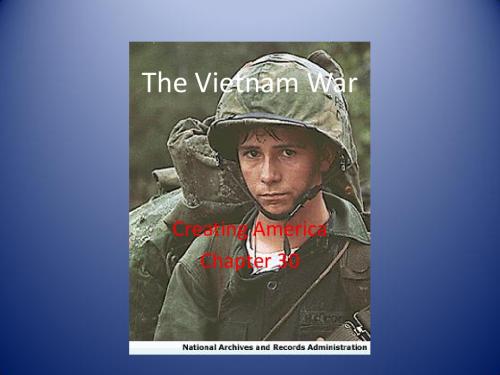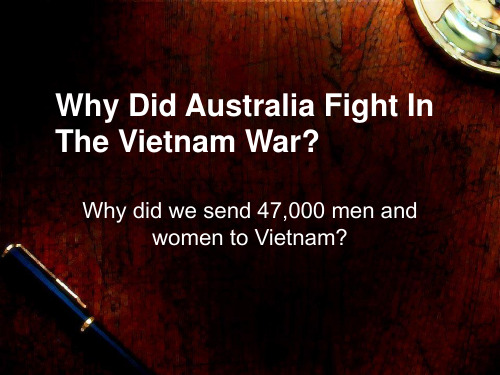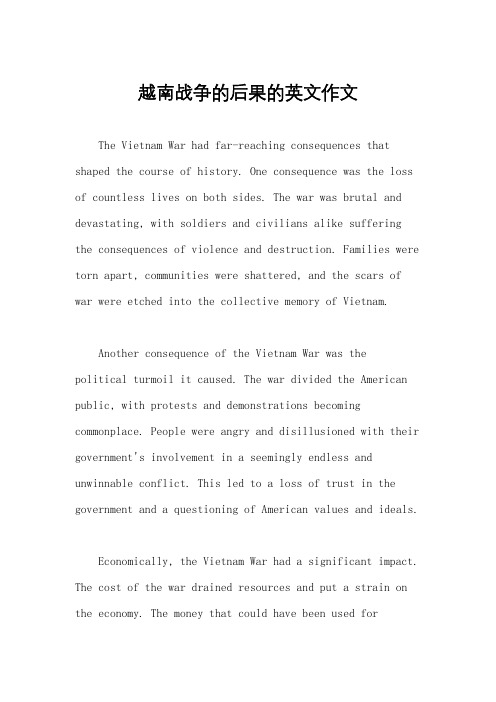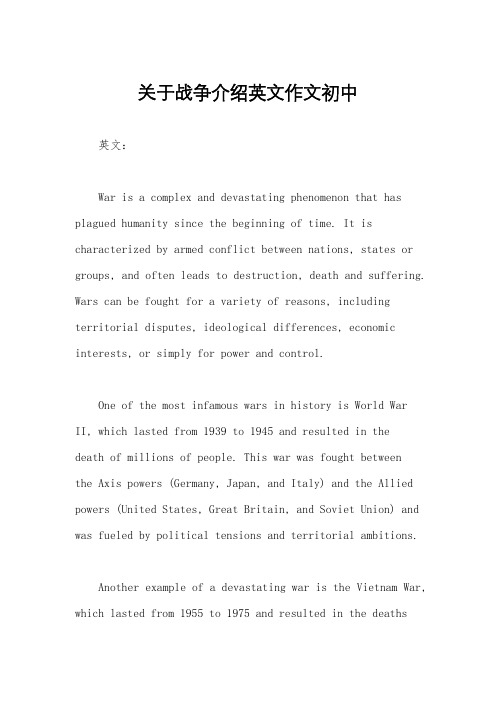越南战争(英文)
四级因果类的英语作文模板

四级因果类的英语作文模板英文回答:Four Causes of the Vietnam War。
The Vietnam War was a complex and multifaceted conflict that lasted from 1955 to 1975. There were many factors that contributed to the outbreak of the war, but four of the most significant were:1. The Cold War: The Cold War was a period of geopolitical tension between the United States and the Soviet Union that began after World War II. The two superpowers competed for influence around the world, and Vietnam became a key battleground in this competition. The United States supported the South Vietnamese government, while the Soviet Union backed the North Vietnamese communists.2. The domino theory: The domino theory was a Cold Warforeign policy strategy that held that if one country in a region fell to communism, it would lead to the collapse of other countries in the region. The United States fearedthat if South Vietnam fell to communism, it would lead to the spread of communism throughout Southeast Asia.3. The Gulf of Tonkin Resolution: The Gulf of Tonkin Resolution was a joint resolution of the United States Congress that was passed in 1964. The resolution authorized the president to use military force in Vietnam in response to an alleged attack by North Vietnamese torpedo boats on U.S. destroyers in the Gulf of Tonkin. The resolution gave the president broad authority to wage war in Vietnam, and it was used to justify the escalation of the American involvement in the conflict.4. The failure of the Geneva Accords: The Geneva Accords were a set of agreements that were signed in 1954 that ended the First Indochina War. The accords divided Vietnam into two separate states, North Vietnam and South Vietnam. The United States and South Vietnam refused to sign the accords, and they were never implemented. Thefailure of the accords contributed to the outbreak of the Vietnam War.中文回答:越南战争的四大起因。
Bob_Dylan鲍勃·迪伦_英文介绍

Had a great influence on music players and bands after him, including The Beatles(披头士)、The Rolling Stones(滚石) 、 Neil Young (尼尔 杨). Contribute to various kings of music, from folk (民谣)、 blues(布 鲁斯)、rock and roll(摇滚乐) ,to even jazz and swing(爵士乐). Especially in rock music ,Dylan was considered to endow rock music with soul.
Dylan’s trip to China !
4th 6thMarch 2011,In Beijing
Dylan’s well-known music
Blowin’ in the wind Knockin’ on Heaven’s Door A Hard Rain’s Gonna Fall Masters of War Like a Rolling Stone Desolation Row Forever Young
Bob Dylan and 1960s’ America
Dylan became a music star in 1960s.1960s is an unrest decade, so many contradictions were await to be solved.
Key Words of 1960’America: Hippie (嬉皮士)、Vietnam War(越南战 争)、The Beat Generation(垮掉一代)、 Cold War(冷战)、Defcon(核战危机)
胡志明与越南战争【英文精品】

Ngo Dinh Diem
• In spite of U.S. aid, Diem did not establish a democratic government in South Vietnam. Instead, his government was corrupt. • In the countryside, for example, he let landlords take back land given to peasants. In addition, he jailed, tortured, and killed opponents.
Escalation of Conflict
• Many Americans thought that, with their superior weapons, U.S. ground forces would quickly defeat the Viet Cong and drive them out of the villages. • Many conditions frustrated American soldiers, however. First of all, they could wage only a limited war, partly because the government feared drawing China into the conflict. • Also, most U.S. soldiers in Vietnam were young and inexperienced. The average soldier was 19 and served a one-year tour of duty.
Viet Cong
高中历史重要词汇中英文对照表

<历史>重要词汇中英文对照表马可·波罗Marco Polo达·迦马Vasco Da Gama麦哲伦Ferdinand Magellan印第安人Indian乔托Giotto米开朗琪罗Buonarroti Michelangelo 拉菲尔Raphael马基雅维利Niccolò Machiavelli塞万提斯Miguel de Cervantes伽利略Galileo中世纪Medieval Period哥伦布Christopher Columbus 商业革命Commercial Revolution 殖民主义colonialism奴隶贸易slave trade文艺复兴Renaissance人文主义humanism但丁Dante达·芬奇Leonardo da Vinci莎士比亚William Shakespeare哥白尼Nicolaus Copernicus 宗教改革The Reformation马丁·路德Martin Luther闵采尔Thomas Müntzer胡格诺派Huguenots加尔文派Calvinists亨利八世He nry Ⅷ圈地运动enclosure movement 都铎王朝House of Tudor斯图亚特王朝House of Stuart詹姆士一世James Ⅰ查理一世Charles Ⅰ英国国教the Anglican Church 清教徒Puritan克伦威尔Oliver Cromwell护国公Lord Protector查理二世Charles Ⅱ詹姆士二世James Ⅱ辉格党Whig托利党Tory光荣革命Glorious Revolution 《权利法案》Bill of Rights君主立宪制Constitutional Monarchy波旁王朝House of Bourbon哈布斯堡王朝House of Habsburg重商主义mercantilism路易十四Louis ⅩⅣ彼得大帝Peter the Great腓特烈二世Frederick Ⅱ凡尔赛宫The Palace of Versailles约瑟夫二世Joseph Ⅱ开明专制enlightened despotism英国东印度公司British East India Company《航海条例》Navigation Acts七年战争Seven Years’ War启蒙运动Enlightenment霍布斯Thomas Hobbes洛克John Locke伏尔泰Voltaire孟德斯鸠Charles Louis de Secondat Montesquieu卢梭Jean Jacques Rousseau狄德罗Denis Diderot百科全书派Encyclopedists第三等级the Third Estate路易十六Louis ⅩⅥ三级会议the Estate-General国民议会National Assembly制宪议会Constituent Assembly巴士底监狱the Bastille法国大革命French Revolution《人权宣言》Declaration of the Rights of Man andof the Citizen雅各宾派the Jacobins罗伯斯庇尔Maximilien de Robespierre热月政变Thermidorian Reaction督政府Directory Government雾月政变Coup d' Etat of Brumaire拿破仑Napoleon Bonaparte执政府the Consulate法兰西第一帝国the First French Empire《拿破仑法典》the Code Napoleon滑铁卢战役Battle of Waterloo杰斐逊Thomas Jefferson富兰克林Benjamin Franklin《常识》Common Sense大陆会议The Continental Congress 乔治·华盛顿George Washington《独立宣言》Declaration of Independence 杜桑·卢维杜尔Toussaint-Louverture伊达尔哥Miguel Hidalgo y Costilla玻利瓦尔Simón Bolívar圣马丁José de San Martín幕府Shogunate武士samurai锁国令Sedusion Orders丰臣秀吉Toyotomi Hideyoshi巴布尔Baber莫卧儿帝国the Mughal Empire阿克巴Akbar工业革命Industrial Revolution飞梭flying-shuttle珍妮纺纱机spinning-jenny骡机spinning-mule水力织布机water-frame瓦特James Watt富尔顿Robert Fulton史蒂芬孙George Stephenson蒸汽时代the Age of Steam亚当·斯密Adam Smith《国富论》The Wealth of Nations维也纳会议the Congress of Vienna维也纳体系Vienna System神圣同盟Holy Alliance四国同盟(1813)Quadruple Alliance卢德运动Luddite movement马克思Karl Marx恩格斯Friedrich Engels《共产党宣言》The Communist Manifesto 共产主义者同盟Communist League科学社会主义Scientific Socialism马克思主义Marxism国际工人协会International Working-men'sAssociation第一国际First International巴黎公社Commune of Paris西进运动Westward Movement自由州Free State蓄奴州Slave State《宅地法》Homestead Act林肯Abraham Lincoln《解放黑人奴隶Emancipation Proclamation 宣言》美国内战Civil War (U.S.)俾斯麦Otto von Bismarch铁血政策Iron and Blood明治维新Meiji Restoration克里米亚战争Crimean War奥斯曼帝国the Ottoman Empire巴布教Bābism西门子Ernst Werner von Siemens 爱迪生Thomas Alva Edison贝尔Alexander Graham Bell马可尼Guglielmo Marconi卡特尔Cartel辛迪加Syndicat托拉斯Trust洛克菲勒John D. Rockefeller容克Junker《江华条约》The Treaty of Kanghua 《朴茨茅斯和约》The Treaty of Portsmouth 苏伊士运河Suez Canal第二国际Second International列宁Vladimir Ilich Lenin奥匈帝国Austria-Hungary斯拉夫人Slaves威廉二世William Ⅱ三国同盟the Triple Alliance三国协约the Triple Entente斐迪南大公Archduke Ferdinand第一次世界大战World War Ⅰ萨拉热窝事件Assassination at Sarajevo笛卡尔René Desc artes牛顿Isaac Newton莱布尼茨Gottfried Wilhelm Leibniz法拉第Michael Faraday麦克斯韦James Clerk Maxwell赫兹Heinrich Rudolf Hertz波义耳Robert Boyle拉瓦锡Antoine-Laurent Lavoisier道尔顿John Dalton阿伏加德罗Amedeo Avogadro门捷列夫Dmitry Ivanovich Mendeleyev 哈维William Harvey林奈Carolus Linnaeus施莱登Matthias Jakob Schleiden施旺Theodor Schwann拉马克Jean-Baptiste de Lamarck达尔文Charles Robert Darwin伦琴Wilhelm Konrad Röntgen居里夫人Marie Sklodowska Curie爱因斯坦Albert Einstein巴斯德Louis Pasteur培根Francis Bacon歌德Johann Wolfgang von Goethe 拜伦George Gordon Byron司汤达Stendhal狄更斯Charles Dickens果戈理Nikolay Gogol普希金Alexander Pushkin安徒生Hans Christian Andersen易卜生Henrik Ibsen马克·吐温Mark Twain泰戈尔Rabindranath Tagore德拉克洛瓦Eugène Delacroix列宾Ilya Yefimovich Repin莫扎特Wolfgang Amadeus Mozart贝多芬Ludwig van Beethoven舒伯特Franz Peter Schubert约翰·施特劳斯Johann Strauss肖邦Frédéric Chopin李斯特Franz Liszt柴可夫斯基Peter Ilich Tchaikovsky莫里哀Molière二月革命February Revolution布尔什维克Bolshevik苏维埃Soviet罗曼诺夫王朝Romanov Dynasty俄国临时政府Russian Provisional Government 东宫Winter Palace十月革命October Revolution红军Red Army战时共产主义Wartime Communism新经济政策New Economic Policy非暴力不合作运动civil disobedience(文明不服从运动)凯末尔 A. Kemal Atatürk甘地M. K. Gandhi印度国民大会党Indian National Congress苏联Union of Socialist Soviet Republics(USSR)斯大林J. Stalin五年计划Five-Year Plan巴黎和会Paris Peace Conference三巨头Big Three威尔逊Woodrow Wilson十四点The Fourteen Points《凡尔赛和约》Treaty of Versailles国际联盟The League of Nations国际联盟盟约Covenant of the League of Nations 华盛顿会议Washington Conference英联邦the British Commonwealth of Nations 自治领Self Governing Dominion法西斯党Fascist Party马克Mark道威斯计划Dawes Plan《洛迦诺公约》Locarno Pact大危机The Great Depression新政New Deal富兰克林·罗斯福 F. D. Roosevelt《国家工业复兴法》The National Industrial Recovery Acts 德国民族社会主义Nation Socialist Workers’工人党Party纳粹Nazi希特勒Adolf Hitler国会纵火案Reichstag Fire西班牙内战Spanish Civil War国际纵队International Brigades美国的中立法American Neutrality Acts《反共产国际协定》Anti-Comintern Pact轴心国Axis Powers绥靖政策Policy of Appeasement慕尼黑协定The Munich Agreement慕尼黑阴谋Munich scheme《苏德互不侵犯Treaty of Non-Aggression条约》Between Soviet Union and Germany 闪击战Blitzkrieg东方战线Eastern Front马奇诺防线Maginot Line自由法国Free French戴高乐Charles de Gaulle不列颠之战Battle of Britain丘吉尔Winston Churchill珍珠港Pearl Harbour《大西洋宪章》Atlantic Charter《联合国家宣言》Declaration by Union Nations中途岛Midway Island诺曼底Normandy开罗会议Cairo Conference《开罗宣言》Cairo Declaration德黑兰会议Teheran Conference雅尔塔会议Yalta Conference《波茨坦公告》The Potsdam Proclamation杜鲁门Harry S. Truman《联合国宪章》Charter of the United Nations联合国大会The General Assembly of the UnitedNations安理会The Security Council冷战Cold War马歇尔计划The Marshall Plan北大西洋公约组织The North Atlantic TreatyOrganization (NATO)华沙条约组织The Warsaw Pact Organization德意志联邦共和国German Federal Republic德意志民主共和国German Democratic Republic柏林墙Berlin Wall越南战争Vietnam War朝鲜战争Korean War欧洲共同体European Communities欧洲煤钢联营European Coal and Steel Community 欧洲经济共同体European Economic Community欧洲原子能联营European Atomic Energy Community 马丁·路德·金Martin Luther King, Jr.民权运动Civil Rights Movement越南民主共和国The Democratic Republic of Vietnam 古巴导弹危机Cuban Missile Crisis中东战争Middle East War尼赫鲁J. Nehru巴勒斯坦Palestine自由军官组织Free Officer's Organization亚非会议The Afro-Asian Conference不结盟运动Non-Aligned Movement第三世界the Third World纳米比亚Namibia77国集团Group of 77石油输出国组织Organization of Petroleum ExportingCountries (OPEC)戈尔巴乔夫Gorbachev白俄罗斯Byelorussia俄罗斯联邦The Russian Federation独立国家联合体Commonwealth of Independent States(CIS)欧洲联盟European Union霸权主义hegemonism《全面禁止核试验Comprehensive条约》Nuclear-Test-Ban Treaty经济全球化economic globalization亚太经济合作组织Asia-Pacific Economic Cooperation(APEC)知识经济knowledge economy可持续发展sustainable development存在主义existentialism汤因比 A. J. Toynbee经济学economics凯恩斯J. M. Keynes未来学futurology萧伯纳G. B. Shaw海明威 E. Hemingway 毕加索P. Picasso爵士乐jazz摇滚乐rock and roll 好莱坞Hollywood卓别林 C. Chaplin。
越南战争 英文

French Rule in Vietnam:
In 1950, the US sent $15 million in aid to the French to help them defeat the Vietminh The French eventually surrendered at Dien Bien Phu – French outpost France, Great Britain, Soviet Union, USA, China, Laos, and Cambodia all met with the Vietminh to set up a peace plan – Geneva Accords This peace plan divided Vietnam into: North Vietnam – Communist South Vietnam – Anticommunist
World: 1966 – Mao Zedong begins cultural revolution in China 1975 – Communists capture Saigon and South Vietnamese surrender
SECTION 1 Moving Toward Conflict
Key Terms: Ngo Dinh Diem Vietcong Ho Chi Minh Trail Tonkin Gulf Resolution
French Rule in Vietnam:
Since the late 1800’s, the French ruled Vietnam, Laos, and Cambodia After WWII, France tried to regain control of these territories USA supported France with over 1 billion dollars…and military support (fear of communism)
越南战争简介

越南在第二次世界大战爆发前是法国的殖民地,第二次世界大战进行中则被 日本占领。1945年第二次世界大战结束前后,胡志明领导的越南独立联盟(越南 共产党)在越南北方城市河内市建立越南民主共和国。法国则支持越南末代皇帝 保大皇帝在越南南方城市西贡市建国。
最先开始援助越南的美国总统是艾森豪 威尔;肯尼迪开始支持在越南作战;林登·约 翰逊将扩大。在尼克松执政时期,美国因国 内的反战浪潮,逐步将军队撤出越南。越南 人民军(北越军)和越共游击队最终打败了 越南共和国军(南越军),统一了全越南。
北越 南越
大事记
1961年5月美国在越南共和国发动特种战争。 1963年11月在美国策划的军事政变中,越南共和国总统吴廷琰被击毙;杨文明和阮庆先后当 选总统。 1964年8月美国制造北部湾事件,开始轰炸越南民主共和国。 1965年3月美国国防军在越南共和国岘港市登陆,把越南战争升级为以美国为主的局部战争; 6月越南共和国军人阮文绍发动政变上台,成立战时内阁,任越南共和国国家领导委员会主 席。 1967年4月越南共和国制宪议会通过新宪法;9月阮文绍当选越南共和国总统。 1968年3月美国被迫宣布部分停止轰炸越南民主共和国。5月越南民主共和国和美国在法国 首都巴黎开始举行会谈。10月美国全面停止轰炸越南民主共和国。 1969年1月越南民主共和国和美国的会谈扩大为越南南方民族解放阵线和越南共和国的四方 会谈。美国在越南共和国开始推行战争越南化政策。6月越南南方民族解放阵线宣布成立以 黄晋发为首的越南南方共和革命临时政府;9月越南民主共和国主席胡志明去世,孙德胜当 选主席。 1973年1月27日越南民主共和国、越南反政府武装·越南南方民族解放阵线、美国、越南共和 国签署《关于在越南战争结束、恢复和平的协定》;3月29日美国国防军完全从越南共和国 撤出。 越南战争历时30年,美国3.8万人死亡、30万人受伤,耗费4450亿美元;越南战争给美国人 民造成了无法估量的心灵创伤,美苏争霸的格局因此而向有利于苏联的转化。 1975年4月30日越南人民军解放越南共和国首都西贡市,越南共和国覆灭,越南战争结束。 1976年1月2日越南社会主义共和国成立,越南统一。
阿甘正传中的涉及到的美国历史事件

《阿甘正传》中的美国历史事件1、1981年前轮驱动型汽车开始在美国流行,公共汽车上的标语也就是一款新型的汽车!至于CITATION IT WORKS广告语是什么意思,我英语水平有限还希望大家给出一个很好的翻译!当时正好是汽车在美国非常流行的时代!2、3K党(Ku Klux Klan,KKK)是美国最早的恐怖组织之一,1866年就有了。
主要鼓吹白人至上的种族主义,使用私刑、绑架、集体屠杀等手段迫害黑人、犹太人和东方人。
世纪上3K党在美国史上有两个,一个成立于南北战争后不久,到19世纪’70年代消失;另一个创始于1951年乔治亚州亚特兰大城,活动至今。
从电影的服装应该不难看出是哪个时代的3k党!3、猫王埃尔维斯•普雷斯利(Elvis Presley)可能是20世纪美国流行音乐中最重要的人物。
猫王,留着长鬓角弹着吉他的猫王,从阿甘那里学来了独到的舞步。
在街边的电视里,伴随着猎狗这首猫王的经典歌曲,猫王肆无忌惮的扭摆着自己的屁股,这是那个时代最过分的举动,也是猫王的招牌动作,不成想是偷师于阿甘,而阿甘看到了儿童不宜。
猫王他虽然不一定是最优秀的,但无可争议的是他使摇滚乐在世界范围的流行普及化。
单从他的唱片销量上就可以看出,他的影响力是非凡的。
从50年代中期到70年代中期这20年间,他的国际热门歌曲一打儿接一打儿,甚至在他去世之后他的任何再版唱片都能保持极其稳定的销量。
毋庸置疑,他是流行音乐历史上唱片销量最高的艺人。
4、小石城事件:1957年9月,美国阿肯色州小石城地方法院根据1954年最高法院关于取消公立学校中种族隔离的决定,宣布该市公立中心中学接纳9名黑人学生入学。
白人种族主义分子激烈反对这一决定。
9月2日,该州州长福布斯以“防暴”为名派出国民警卫队前往阻止黑人学生入学,但未成功。
23日,在州长的纵容下,上千名种族主义分子包围学校,殴打黑人记者,并把8名入学的黑人学生赶走。
随后南方几个州也发生了袭击黑人的事件。
高二英语国际关系单选题30题(带答案)

高二英语国际关系单选题30题(带答案)1.International relations were greatly influenced by Winston Churchill. Which event is he most closely associated with?A.World War IB.Cold WarC.World War IID.Vietnam War答案:C。
温斯顿·丘吉尔在第二次世界大战中发挥了重要作用。
第一次世界大战他有参与但不是最紧密相关。
冷战时期主要是美苏对峙,丘吉尔不是核心人物。
越南战争他没有参与。
2.The establishment of the United Nations was mainly in response to which event?A.World War IB.Korean WarC.World War IID.Cuban Missile Crisis答案:C。
联合国是在第二次世界大战后建立的,目的是维护世界和平与安全。
第一次世界大战后建立的是国际联盟。
朝鲜战争和古巴导弹危机都是在联合国成立后发生的事件。
3.Mahatma Gandhi is known for his non-violent resistance. In which country did he lead this movement?A.IndiaB.South AfricaC.PakistanD.Bangladesh答案:A。
甘地在印度领导非暴力不合作运动。
虽然他曾在南非有过活动,但主要的非暴力抵抗运动是在印度。
巴基斯坦和孟加拉国在甘地时期还未独立。
4.Nelson Mandela is a symbol of the struggle against apartheid. In which country did he fight for equality?A.EgyptB.South AfricaC.NigeriaD.Kenya答案:B。
哈金 英文作品

哈金英文作品
哈金(Ha Jin)是一位著名的华裔美国作家和翻译家,他的作品主要以英文写作并广受国际文学界的赞誉。
他的作品涵盖了小说、散文、回忆录和文学评论等多个领域。
以下是一些哈金的英文作品:
1. 《等待》(Waiting):这是哈金最著名的作品之一,是一部描述中国人在文革时期生活的小说。
这本书因其深刻的社会洞察和人性描绘而广受好评,并获得了1999年的美国国家图书奖(National Book Award)和2000年的普利策小说奖(Pulitzer Prize for Fiction)。
2. 《在南京》(In the Pound):这是一部短篇小说集,其中许多故事都以哈金在中国的生活经历为背景。
3. 《战争垃圾》(War Trash):这是另一部小说,讲述了中美两国在朝鲜战争期间的冲突和交往。
4. 《疯狂的石头》(A Crazy Stone and Other Stories of the Vietnam War):这是一部关于越南战争的小说集,通过不同的角度和人物描绘了战争对人性的影响。
5. 《故乡》(A Good Fall):这是一本半自传体小说,讲述了主人公回到中国探望年迈父母的故事,反映了东西方文化的冲突与融合。
6. 《红军爱人》(A Lover of Red Army):这本小说以文革为背景,讲述了一段禁忌的爱情故事。
7. 《移民作家》(The Writer as Migrant):这是一本文学评论集,哈金在其中探讨了自己作为移民作家的身份和经历,以及移民文学在跨文化交流中的重要性。
越南战争英文介绍【精品】

-Gulf of Tonkin (1964) US destroyer Maddox was fired on by North Vietnamese torpedo boats Gave broad congressional approval for the expansion of the Vietnam War -Tet Offensive (1968) Consisted of a series of sharp attacks on urban and rural areas in South Vietnam by the Vietcong -Paris Peace Agreement (January 1973) United States and North Vietnam signed which provided the withdrawal of all remaining U.S. forces from Vietnam -The Fall of Saigon (April 30, 1975) Capture of Saigon, the capital of South Vietnam by North Vietnamese Army; event marked the end of the Vietnam War
Timeline of Key Events
-Battle of Dien Bien Phu (1954) Starts US Evolvement in Vietnam War
/topics/vietnam-war/audio#dien-bien-phu-falls
Wounded soldier being taken off the battlefield
澳大利亚为何参加越南战争【英文】

• The Malayan Emergency 1955
– Communists were becoming influential and fighting a guerilla war in Malaya
Australia sends troops to Vietnam
• The Australian government felt that the best way to deal with communist threats was to send troops to the threat • In 1962 Australia sent 30 military advisers to assist US forces in South Vietnam
• The presence of communists in Vietnam worried countries like Australia and USA
The Domino Theory
• Australian and American politicians felt that if Vietnam fell to communism then other countries such as Thailand, Malaysia, Singapore and Indonesia would also fall to the communistNZUS agreement of 1951.
• Australia, New Zealand and the United States agree to come to each other’s aid in the event of an attack
发生了很多战争英语作文

发生了很多战争英语作文英文:Wars have been a constant presence throughout human history. From ancient times to the present day, countless conflicts have arisen between nations, groups, and individuals. These wars have been fought for a variety of reasons, such as territorial disputes, ideological differences, and resource control.One of the most devastating wars in history was World War II, which took place from 1939 to 1945. The war was fought between the Axis powers, led by Germany, Japan, and Italy, and the Allies, led by the United States, Great Britain, and the Soviet Union. The war resulted in the deaths of millions of people and the destruction of countless cities and towns.Another example of a major war was the Vietnam War, which took place from 1955 to 1975. The war was foughtbetween communist forces in North Vietnam and the government of South Vietnam, with the support of the United States and other anti-communist allies. The war was highly controversial, and resulted in the deaths of over 3 million people, including civilians.Despite the devastation and loss of life caused by wars, they continue to occur to this day. In recent years,conflicts have arisen in Syria, Ukraine, and other parts of the world. These conflicts have led to the displacement of millions of people and the destruction of entire cities.中文:战争是人类历史上不可避免的一部分。
世界历史学 重要词汇术语 中英文对照表 完整对译版

A阿克巴Akbar安理会The Security Council奥斯曼帝国the Ottoman EmpireB巴勒斯坦Palestine巴黎公社Commune of Paris巴黎和会Paris Peace Conference 巴士底监狱the Bastille 霸权主义hegemonism 百科全书派Encyclopedis ts柏林墙Berlin Wall 北大西洋公约组织The North Atlantic Treaty北伐战争 the Northern Expedition 彼得大帝Peter the Great俾斯麦Otto von Bismarch毕加索P. Picasso波茨坦公告》The Potsdam Proclamatio 波旁王朝House of Bourbon玻利瓦尔Simón Bolívar不结盟运动Non-Aligned Movement不列颠之战Battle of Britain布尔什维克主义B olshevism C查理二世Charles Ⅱ查理一世Charles Ⅰ常识》Common Sense朝鲜战争Korean War 存在主义existentialis mD达·芬奇Leonardo da Vinci达·迦马Vasco Da Gama大陆会议The Continental Congress大危机The Great Depression大西洋宪章》Atlantic Charter大跃进运动 t he Great Leap戴高乐Charles de Gaulle但丁Dante道威斯计划Dawes Plan德国民族社会主义Nation Workers’Socialism德黑兰会议Teheran Conference 德意志联邦共和国German Federal Republic德意志民主共和国German Democratic Republic狄德罗Denis Diderot第三等级the Third Estate第三世界the Third World第一国际First International 东方战线Eastern Front 东宫Winter Palace都铎王朝House of Tudor督政府Directory Government 独立国家联合体Commonwea lth of Independent States独立宣言》Declaration of IndependencHarry S. Truman杜桑·卢维杜尔Toussaint-Louverture 俄罗斯联邦The Russian Federation鄂豫皖根据地H ubei-Henan-Anhui Base Area 恩格斯Friedrich EngelsF法国大革命French Revolution 法兰西第一帝国the First French Empire法西斯党Fascist Party 凡尔赛宫The Palace of Versailles 凡尔赛和约》Treaty of Versailles反共产国际协定》Anti-Comintern Pact飞梭flying-shuttle 非暴力不合作运动civil disobedience 腓特烈二世Frederick ⅡToyotomi Hideyoshi伏尔泰Voltaire富尔顿Robert Fulton富兰克林Benjamin Franklin富兰克林·罗斯福F. D. Roosevelt富农r ich peasant G甘地M. K. Gandhi戈尔巴乔夫Gorbachev哥白尼Nicolaus Copernicus 哥伦布Christopher Columbus根据地b ase area 工人党Party工业革命Industrial Revolution 共产党宣言》The Communist Manifesto共产主义者同盟Communist League古巴导弹危机Cuban Missile Crisis顾维钧W ellington KooGlorious Revolution贵族院(日本)t he House of Peers国富论》The Wealth of Nations 国会纵火案Reichstag Fire国际工人协会International Working-men's国际联盟The League of Nations 国际联盟盟约Covenant of the League of Nations 国际纵队International Brigades国家工业复兴法》The National Industrial Recovery国民议会National AssemblyH哈布斯堡王朝House of Habsburg海明威E. Hemingway 航海条例》Navigation Acts好莱坞Hollywood 亨利八世Henry Ⅷ红军Red Army胡格诺派Huguenots 护国公Lord Protector华沙条约组织The Warsaw Pact Organization 华盛顿会议Washington Conference 滑铁卢战役Battle of Waterloo辉格党Whig Party 霍布斯Thomas HobbesJ加尔文派Calvinists杰斐逊Thomas Jefferson解放黑人奴隶宣言》Emancipatio n禁止核试验条约》Nuclear-Test-Ban经济全球化economic globalization 伽利略Galileo爵士乐jazz君主立宪制Constitutiona l Monarchy K开罗会议Cairo ConferenceCairo Declaration 开明君主专制enlightened despotism凯恩斯J. M. Keynes 凯末尔A. Kemal Atatürk凯末尔革命Kemal Revolution 科学社会主义Scientific Socialism可持续发展sustainable development 克里米亚战争Crimean War 克伦威尔Oliver CromwellL拉菲尔Raphael冷战Cold War联合国United Nation(UN)联合国军United-N ational Army联合国大会The General Assembly of UN联合国家宣言》Declaration by Union Nations》Charter of the United Nations林肯Abraham Lincoln卢德运动Luddite movement卢梭Jean Jacques Rousseau路易十六Louis ⅩⅥ路易十四Louis ⅩⅣ罗伯斯庇尔Maximilien de Robespierre 骡机spinning-mule洛迦诺公约》Locarno洛克John Locke M马丁·路德Martin马丁·路德·金Martin马可·波罗Marco Polo 马克思Karl Marx马克思主义Marxism马奇诺防线Maginot Line 马歇尔计划The Marshall Plan麦哲伦Ferdinand Magellan满洲国M anchuriaku o法American Neutrality Acts美国内战Civil War (U.S.)门户开放政策O pen Door Treaty孟德斯鸠CharlesLouis de Secondat Montesquieu 米开朗琪罗Buonarroti Michelangelo民权运动Civil Rights Movement民主集中制 d emocratic centralism闵采尔Thomas Müntzer明治维新Meiji Restoration命令主义c ommandism 莫卧儿帝国the Mughal Empire幕府Shogunate慕尼黑协定The Munich Agreement慕尼黑阴谋Munich schemeN拿破仑·波拿巴Napoleon Bonaparte》the Napoleon纳粹党Nazi纳米比亚Namibia南京临时约法P rovisional Constitution of Nanking 南洋兄弟烟草公司South-ocean Brothers Tobacco Companies 尼赫鲁J. Nehru农业合作社A gricultural Producer's Cooperative 奴隶贸易slave trade诺曼底NormandyO欧洲共同体European Communities 欧洲经济共同体European Economic Community欧盟European Union(EU)欧洲煤钢联营European Coal and Steel Community联营European Atomic Energy Community Q七年战争Seven Years’War七十七国集团Group of 77启蒙运动Enlightenme nt乔托Giotto乔治·华盛顿George Washington 清教徒Puritan丘吉尔Winston Churchill圈地运动enclosure movement权利法案》Bill of Rights R热月政变Thermidoria n Reaction 人权宣言》Declaration of the Rights of Man and of the人文主义humanism日俄战争R usso-JapaneseS三反运动T hree-Antis Campaign 三级会议the Estate-General三巨头Big Three莎士比亚William Shakespeare 闪击战Blitzkrieg商业革命Commercial Revolution 神圣同盟Holy Alliance圣马丁José de San Martín十四点The Fourteen Points十月革命October Revolution 石油输出国组织Organization of Petroleum Exporting史蒂芬孙George Stephenson 斯大林J. Stalin斯大林模式Stalinism Mode水力织布机water-powered frame斯图亚特王朝House of Stuart四国同盟(1813)Quadruple Alliance苏德互不侵犯条约》Treaty Between Soviet Union and苏联Union of Socialist Soviet Republics绥靖政策Policy of Appeasement 锁国令Sedusion Orders汤因比A. J. ToynbeeT铁血政策Iron and Blood土地改革 Land reform 土地改革Land Reform 托利党Tory托洛茨基 Leon Trotsky W瓦特James Watt外蒙古O uter Mongolia威尔逊Woodrow Wilson维也纳会议the Congress of Vienna维也纳体系Vienna System文化大革命 t he Cultural Revolution 文艺复兴Renaissance五年计划Five-Year Plan武士道Samurai DO 雾月政变Coup d' Etat of Brumaire X西班牙内战Spanish Civil War西进运动Westward Movement 西门子Ernst Werner von Siemens 希特勒Adolf Hitler 下院t he Lower House萧伯纳G. B. Shaw 小匈牙利事件M iniature Hungarian Incident辛丑条约 Protocol of 1901新经济政策New Economic Policy新政New Deal蓄奴州Slave State Y雅尔塔会议Yalta Conference 雅各宾派the Jacobins 亚当·斯密Adam SmithThe Afro-Asian Conference亚太经济合作组织APEC亚太经济合作组织Asia-Pacific Economic Cooperation 样板戏M odel Opera 摇滚乐rock and roll 一五计划F irst Five Year Plan伊达尔哥Miguel Hidalgo y Costilla印第安人Indian印度国民大会党Indian National Congress英国东印度公司British East India Company英国国教the Anglican Church英联邦the British Commonwea lth of Nations右倾保守主义Right conservatism 右倾机会主义者Right opportunist和国The Democratic Republic of Vietnam越南战争Vietnam WarZ宅地法》Homestead Act詹姆士二世James Ⅱ詹姆士一世James Ⅰ战时共产主义Wartime Communism 珍妮纺纱机spinning-jenny珍珠港Pearl Harbour蒸汽时代the Age of Steam知识经济knowledge economy执政府the Consulate殖民主义colonialism 制宪议会Constituent Assembly中东战争Middle East War中世纪Medieval Period中途岛Midway Island重商主义mercantilism 轴心国Axis PowersSubjectivism 卓别林Chales“自由法国”Free French自由军官组织Free Officer's Organization 自由州Free State自治领Self Governing Dominion宗教改革The Reformation 左倾教条主义Leftist Doctrinairis。
越南战争的后果的英文作文

越南战争的后果的英文作文The Vietnam War had far-reaching consequences that shaped the course of history. One consequence was the loss of countless lives on both sides. The war was brutal and devastating, with soldiers and civilians alike suffering the consequences of violence and destruction. Families were torn apart, communities were shattered, and the scars of war were etched into the collective memory of Vietnam.Another consequence of the Vietnam War was thepolitical turmoil it caused. The war divided the American public, with protests and demonstrations becoming commonplace. People were angry and disillusioned with their government's involvement in a seemingly endless and unwinnable conflict. This led to a loss of trust in the government and a questioning of American values and ideals.Economically, the Vietnam War had a significant impact. The cost of the war drained resources and put a strain on the economy. The money that could have been used fordomestic programs and development was instead poured into the war effort. This resulted in inflation, a weakened economy, and a burden on future generations who had to bear the financial consequences of the war.The Vietnam War also had a profound effect on the mental health of those who experienced it. Soldiers returned home with physical injuries, but many also suffered from psychological trauma. Post-traumatic stress disorder (PTSD) became a recognized condition, and veterans struggled to reintegrate into society. The war left deep emotional scars that continue to affect individuals and families to this day.Additionally, the Vietnam War had a lasting impact on international relations. It highlighted the limits of American military power and the importance of diplomacy in resolving conflicts. The war also strained relations between the United States and other countries, particularly those in the communist bloc. It further deepened the divide between East and West and contributed to the global tensions of the Cold War era.In conclusion, the Vietnam War had far-reaching consequences that continue to shape our world today. It resulted in loss of life, political turmoil, economic strain, mental health issues, and strained international relations. The war left a lasting impact on Vietnam and the United States, and its consequences are still felt decades later.。
越南战争的后果的英文作文

越南战争的后果的英文作文英文:The consequences of the Vietnam War were far-reaching and had a lasting impact on the country and its people. The war resulted in the deaths of millions of people, including soldiers and civilians, and left many others injured and traumatized. The use of chemical weapons such as Agent Orange also led to widespread environmental and health problems that continue to affect the population to this day.The war also had a profound effect on the political and social landscape of Vietnam. The country was left deeply divided, and the scars of the war are still visible in the form of unexploded ordnance and landmines that continue to pose a threat to the population. The war also led to a mass exodus of refugees, with many fleeing the country in search of safety and a better life elsewhere.Economically, the war took a heavy toll on Vietnam. Thecountry's infrastructure was devastated, and the cost of rebuilding was immense. The war also disrupted the country's agricultural sector, leading to food shortages and economic hardship for many people.In addition to the direct impact on Vietnam, the war also had broader geopolitical implications. It strained relations between the United States and other countries, and its legacy continues to shape the way the U.S. approaches foreign policy and military intervention.Overall, the Vietnam War had a devastating impact on the country and its people, and its consequences continue to be felt to this day.中文:越南战争的后果是深远的,对国家和人民产生了持久的影响。
【参考文档】与战犯相关的英语小知识word版本 (2页)

【参考文档】与战犯相关的英语小知识word版本
本文部分内容来自网络整理,本司不为其真实性负责,如有异议或侵权请及时联系,本司将立即删除!
== 本文为word格式,下载后可方便编辑和修改! ==
与战犯相关的英语小知识
战犯的英文:
war criminal
参考例句: The War criminal laid hands on himself to escape punishment.
这个战犯畏罪自杀了。
war是什么意思:
n. 战争(状态,期间);竞争;冲突;对抗;斗争
v. 进行战争;交战;作战
This is an antecedent of the war.
这是战争的前因。
Glaring examples were the Korean War and then the Vietnam War.
最突出的就是朝鲜战争,后来还有越南战争、朝鲜战争。
Just wars are bound to triumph over wars of aggression.
正义战争必然要战胜侵略战争。
a book the length of `War and Peace'
像《战争与和平》篇幅那样长的书 plunge a country into war
使一个国家陷入战争 criminal是什么意思:
adj. 刑事上的;犯罪的;可耻的
n. 罪犯
The policeman figured the features of the criminal.
这个警察描述了这个罪犯的特征。
The case today is the delivery of a criminal.。
越南战役海报模板作文英语

越南战役海报模板作文英语英文回答:Instructions for Creating a Vietnam War Poster。
Materials:Blank poster board。
Markers, crayons, or paint。
Scissors。
Glue。
Photographs (optional)。
Step 1: Choose a Design Concept。
Decide what message you want to convey through yourposter.Consider the historical context of the Vietnam War and the perspectives of different groups involved.Step 2: Gather Materials。
Collect materials that will help you illustrate your message, such as photographs, documents, or symbols.Step 3: Layout the Poster。
Sketch out a rough design for your poster on the blank poster board.Determine the placement of text, images, and any other elements.Step 4: Create Text Elements。
Write a concise and powerful headline or slogan that captures your message.Use a variety of fonts and sizes to create visual interest.Include a call to action, such as "Support the troops" or "End the war."Step 5: Integrate Images。
关于战争介绍英文作文初中

关于战争介绍英文作文初中英文:War is a complex and devastating phenomenon that has plagued humanity since the beginning of time. It is characterized by armed conflict between nations, states or groups, and often leads to destruction, death and suffering. Wars can be fought for a variety of reasons, including territorial disputes, ideological differences, economic interests, or simply for power and control.One of the most infamous wars in history is World War II, which lasted from 1939 to 1945 and resulted in thedeath of millions of people. This war was fought betweenthe Axis powers (Germany, Japan, and Italy) and the Allied powers (United States, Great Britain, and Soviet Union) and was fueled by political tensions and territorial ambitions.Another example of a devastating war is the Vietnam War, which lasted from 1955 to 1975 and resulted in the deathsof over 2 million people. This war was fought between North Vietnam (supported by the Soviet Union and China) and South Vietnam (supported by the United States) and was driven by ideological differences and the desire for control over Vietnam.Despite the devastating consequences of war, it continues to be a reality in our world today. Conflicts continue to arise, and innocent people continue to suffer. It is important for us to work towards peace and understanding, and to find ways to resolve conflicts without resorting to violence.中文:战争是一种复杂而毁灭性的现象,自人类诞生以来就一直困扰着人类。
尼克松,基辛格与越南战争【英文】

2.) States as dominant actors – (some disdain for domestic politics)
3.) Statesmen act to promote the “national interest” – maximizing power/ issue of morality
Weimar Republic; Orthodox Jewish upbringing; intense love for soccer
2.) Ten years old in 1933 when Hitler and
the Nazis came to power
3.) Came to the United States in 1938 as
2.) Loss of American Global Dominance – Politically, Economically, Militarily – Perceptions of American Decline
3.) Domestic Crisis of Legitimacy – Protests at Home, Watergate, Congress and the end of the Imperial Presidency
4.) New Centers of Power – Europe and Japan 5.) Soviet Expansionism – Successes in the Third
World
Richard Nixon
Pre-Presidential Career
- 1、下载文档前请自行甄别文档内容的完整性,平台不提供额外的编辑、内容补充、找答案等附加服务。
- 2、"仅部分预览"的文档,不可在线预览部分如存在完整性等问题,可反馈申请退款(可完整预览的文档不适用该条件!)。
- 3、如文档侵犯您的权益,请联系客服反馈,我们会尽快为您处理(人工客服工作时间:9:00-18:30)。
Operational survey:
On February 17, 1979 China invaded, the war started, to seize Mengguan town.
On February 18 seizes the clear water, the Vietnamese troops to the gallery resists stubbornly in the Gaoping front, forgives area the mountain, Dongdang's guided missile position is destroyed, the Laokay fierce combat, the Lai continent Vietnamese troops retreat Heihe Nanan. On February 19 attacks and seizes river County Magistrate Lu the snow-capped mountain, the air force bombing the coast defense.
On February 20 captures Laokay, Dongdang, a package of happy fierce combat, the Vietnamese air force attacks west of the river mouth the reinforcing unit.
On February 21 captures the Gaoping.
On February 22 seizes a package of unhappiness, the Vietnamese troops reassigns in Cambodian and Laos's army returns to guards against, 2 teachers which defends Hanoi attempts to the Gaoping, the Laichau aspect China army to launch the counter-attack, the idle work.
On February 23 forgives nearby the mountain the high horse hill eruption intense attack and defense war, captures the river river. Reenforce two teachers under air protection, attack awn street, Locbinh.
On February 24 the Vietnamese troops counter-attack, with the Chinese army in the Gaoping, Laokay had the street fighting Vietnamese troops once to attempt to seep enters within the boundaries of China, but all suffered routs. Captures the citrus reticulata the pond. On February 25 gets up the combat situation rubber, the Vietnamese troops cling to tenaciously border defense important place to forgive the mountain. On March 1 forgives the mountain fierce combat, the Vietnamese troops reenforces sharpest 308th Shi Xiang from Hanoi to forgive the mountain to launch counter-attack, and use chemical weapon. On March 4 308 teachers suffer China to repel, forgive the mountain downcast.
On March 5 China announced achieved "punishes Viet Nam" the goal, starts to withdraw troops. Vietnam announces the national general mobilization command, the pledge resistance. On March 7 gets up China officially to withdraw troops, and plundering commodity, when use military supplies vehicles return trip carries within the boundaries of China. Many place Vietnamese industry and mining industry equipment suffers the destruction. On March 13 continues to withdraw troops, China lays down the land mine in the route of withdrawal, shields the withdrawal of troops by the rocket and the long distance fire. Vietnamese troops not large-scale pursuit motion.
On March 16 China announced completes the withdrawal of troops motion, the war ended.
◎作战概况:1979年2月17日中国入侵,战争开始,占领孟关镇。
2月18日占领清水,越军在高平战线以坑道顽抗,谅山、同登一带的飞弹阵地被摧毁,老街激战,莱洲越军退守黑河南岸。
2月19日突袭并占领河鹿县长白山,空军轰炸海防。
2月20日攻陷老街、同登,包乐激战,越南空军攻击河口以西的增援部队。
2月21日攻陷高平。
2月22日占领包乐,越军抽调驻高棉与寮国的部队回防,防守河内的2个师试图对高平,莱州方面中国部队展开反击,无功。
2月23日谅山附近高马山爆发激烈攻防战,攻陷河江。
增援的两个师在空军掩护下,进攻芒街、禄平。
2月24日越军反击,与中国部队在高平、老街发生巷战越军曾试图渗透进入中国境内,但全遭击溃。
攻陷柑塘。
2月25日起战情胶著,越军死守边防要地谅山。
3月1日谅山激战,越军自河内增援最精锐之第308师向谅山展开逆袭,并使用化学武器。
3月4日308师遭中国击退,谅山陷落。
3月5日中国宣布达到“惩越”目的,开始撤军。
越南宣布全国总动员令,誓言抵抗到底。
3月7日起中国正式撤军,并掠夺物资,利用补给车辆回程时载回中国境内。
多处越南工矿业设备遭破坏。
3月13日继续撤军,中国在撤退路线上铺设地雷,以火箭与长程炮火掩护撤军。
越军无大规模追击行动。
3月16日中国宣布完成撤军行动,战争结束。
Vietnam War
conflict in Southeast Asia, primarily fought in South Vietnam between government forces aided by the United States and guerrilla forces aided by North Vietnam. The war began soon after the Geneva Conference provisionally divided (1954) Vietnam at 17° N lat. into the Democratic Republic of Vietnam (North Vietnam) and the Republic of Vietnam (South Vietnam). It escalated from a Vietnamese civil war into a limited international conflict in which the United States was deeply involved, and did not end, despite peace agreements in 1973, until North Vietnam's successful offensive in 1975 resulted in South Vietnam's collapse and the unification of Vietnam by the North.。
